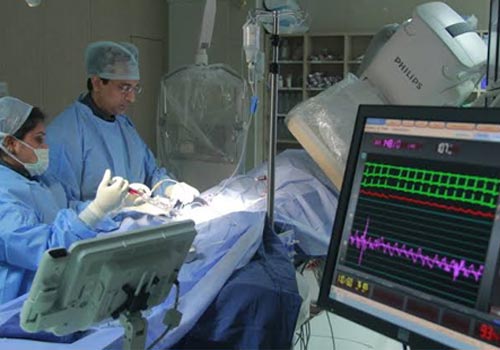Cardiac Care Technology
Cardiac Care technology
Cardiac Care Technology measures how well a heart is functioning and can monitor heart rate. Technicians here measure how well a patient’s heart is functioning. Cardiac care technicians are the medical professionals who administer various tests that assist the doctor in diagnosis. Cardiac care technicians assist physicians during invasive cardiovascular testing, where a tube is inserted into one of the blood vessels that carry blood into the heart. Once doctors insert the catheter, technicians monitor patients’ heart rates and blood pressure, looking for any signs of trouble or distress

PROGRAM HIGHLIGHTS
Cardiac Care technology program encompasses groundbreaking advancements in the realm of cardiovascular health. Notable features encompass state-of-the-art diagnostic tools, including cutting-edge imaging techniques and wearable monitoring devices that furnish real-time data for precise evaluations. Interventional technologies, such as minimally invasive procedures, robotic-assisted surgeries, and implantable devices, deliver accuracy and enhanced patient outcomes. Moreover, the program places emphasis on telemedicine and remote patient monitoring systems, facilitating specialized care accessibility for individuals residing in remote areas.
Pioneering research initiatives propel the development of innovative therapies, personalized medicine, and artificial intelligence algorithms, augmenting risk prediction, early detection, and treatment strategies. Overall, the program seamlessly integrates technology to revolutionize cardiac care, ensuring optimum patient care and an improved quality of life.
B.Voc Cardiac Technology Eligibility Criteria
Eligibility criteria for BSc Cardiac Care Technology, it varies based on the policies of colleges or universities. In order to pursue the BSc Cardiac Technology degree program, students need to meet certain requirements, ensuring a strong foundation in science and demonstrating their commitment. The following eligibility criteria should be followed:
- Academic Qualification: Students should have successfully completed their 10+2 education in the science stream with a minimum of 50 percent marks. This qualification must be obtained from a recognized board or institution.
- Core Subjects: Aspiring candidates must have studied Physics, Chemistry, and Biology in their last qualifying examination. These subjects provide essential knowledge and understanding related to cardiac technology.
- Entrance Test: Along with meeting the academic requirements, students are also required to clear the entrance test conducted by the respective institute. The entrance test is designed to assess the aptitude and knowledge of the applicants. The institute will specify the minimum cutoff marks that need to be achieved in order to qualify for further rounds of selection.

